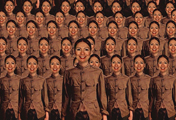 If you’re a musician, you probably get asked whether you do original songs or covers. And as unassuming as that question sounds, it’s actually a hornet’s nest buzzing with speculation on your intent, ambition, and talent. Do you have your own thoughts? Do you have something engaging and identifiable to say? Or do you just echo the ideas of other writers?
If you’re a musician, you probably get asked whether you do original songs or covers. And as unassuming as that question sounds, it’s actually a hornet’s nest buzzing with speculation on your intent, ambition, and talent. Do you have your own thoughts? Do you have something engaging and identifiable to say? Or do you just echo the ideas of other writers?
Are you an artist or a mimic?
Originality — the quality of being new, fresh, innovative, or novel — is the difference between a piano player and a player piano. It is the distinction between a painting on canvas and a print from the museum gift shop.
It is the thing that can’t be copied.
No doubt there are more covers of Nirvana’s “Smells Like Teen Spirit” than there are ukulele bands in the world to attempt them. Yet it’s the original version of the song people love most.
Granted, most artists begin their careers by emulating others. But then they grow beyond those constraints. In time they render their work as distinctively as Nature renders a strand of DNA.
Originality and identity
 Artists often believe their work is original because of something they do. Or because of the way they do it. But nothing an artist does is as distinctive as who they are. Originality isn’t developed as much as it is discovered. Like any coming of age, the process of finding one’s creative voice is a journey.
Artists often believe their work is original because of something they do. Or because of the way they do it. But nothing an artist does is as distinctive as who they are. Originality isn’t developed as much as it is discovered. Like any coming of age, the process of finding one’s creative voice is a journey.
The novelist Joseph Heller glimpsed the insanity of war in a way that was all his own. William Faulkner drew a map in his mind that only he could navigate. Kurt Vonnegut wrote in a voice that was recognizable without attribution. These writers were being who they were — and “bottling” that originality in their work.
The ancient Greeks said, “know thyself.” When you do, you know what makes your work unique. And your originality shows.
Blending in vs. standing out
You might think, “Nothing I hear on the radio is original. Why would I want to write anything that is?” And if your goal is to blend in with the crowd, then you might have a point. Your chances of writing accessible songs are greater if you keep your ideas “universal” (songwriting code for “clichéd”) than if you set them apart. But cloning the work of other songwriters will also make you easy to forget. Unless you’re ready and willing to do battle with an army of soundalikes — and it’s a big army — you’re better off sticking to your own territory, with your own original style and point of view.
The world doesn’t need you to be a second-rate somebody else.
It needs you to be the writer no one else can be.
—
Mark Doyon is principal and creative director of Wampus Multimedia, a record label, publishing imprint, and creative branding agency based in the Washington, D.C. area.